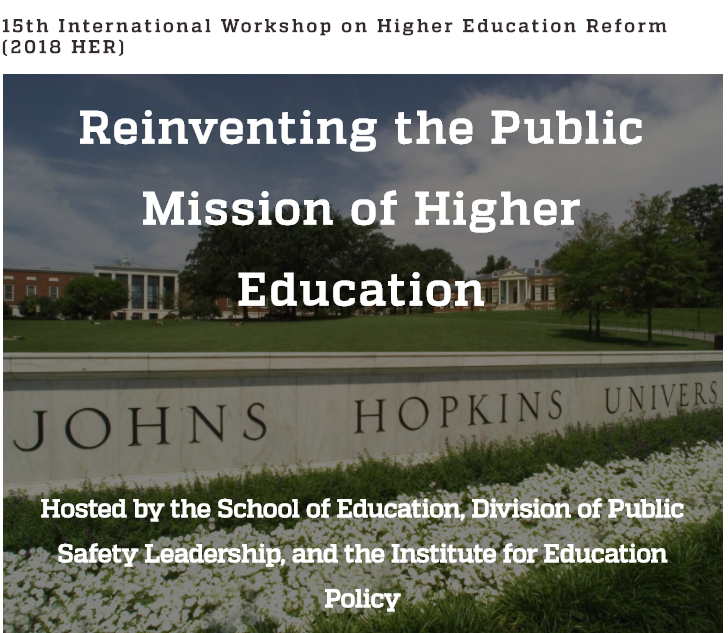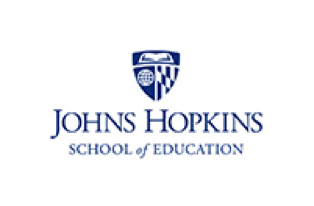

HER2018 Call for Papers extended to 5th May, 2018

15th International Workshop/Conference on Higher Education Reform (2018HER)
Johns Hopkins University, Baltimore, Maryland, USA
September 24-26, 2018
Call for Papers
Reinventing the Public Mission of Higher Education: Policies and Practice
[pdf version of this Call for Papers can be downloaded here]
The Institute for Education Policy, the Division of Public Safety Leadership and the School of Education at Johns Hopkins University are pleased to host the 15th International Workshop/Conference on Higher Education Reform (HER). This will be the latest in a series of international workshops, inaugurated by the University of British Columbia (Canada) in 2003, with a focus on research investigating various aspects of policy reforms and other major changes in higher education.
Theme of the Workshop/Conference
The concept of the “public mission” of universities has several dimensions. In the broader and more general sense, it is the university's public mission to provide science-based knowledge, critical reflection, and discourse of the larger and more fundamental questions of society. This general function has become recently challenged as some governments openly question or simply dismiss scientific evidence and disregard it as illegitimate. The discussion of this more fundamental dimension of “society engagement” is therefore very timely and should figure prominently in the program of the workshop. The second meaning, “community engagement,” emphasizes the more instrumental dimension: collaboration of various kinds between higher education institutions and their “communities.”
To many universities and other higher education institutions are attributed three major, interrelated missions: education, the generation of new knowledge, and engagement with society or “the community.” While the processes and structures associated with teaching and research are relatively well defined and analyzed, this is less the case with the third mission. Mission statements, websites, and promotional materials often underline an institution’s commitment to community engagement and public responsibility. However, despite the growing importance of higher education’s public mission at a declamatory level, its implementation in practice is not clear-cut. The wide range of activity incorporated by the universities’ community engagement suggests that a precise definition of the public mission is difficult, and that organizing and coordinating such external activities and internal policies is a complex task.
This task might begin with articulating, generally, the current and future public mission of higher education and what difference this mission makes to society and the community as well as to the higher education institution. Another question is which specific public missions apply to which universities and other higher education institutions. This will depend on their respective internal characteristics (e.g. traditions, mission, structures, and policies), external environment (e.g., demographics, sociocultural, economic, and political), and the variety of the institution’s stakeholders, both internal and external.
Looking to the future, universities and HEIs will have to become or remain active to move with the political, economic, and technological winds. With increased globalization, many institutions will have to reimagine themselves in light of global citizenship. Many institutions will rely increasingly upon online delivery education. Public missions will need to be well-defined, well- planned, and well-supported. The means of assessment will need to be clear, relevant, and effective.
Issues
We invite contributions dealing with the theme of the public mission of higher education, which may address such issues as the following:
- Deconstructing “community engagement.” What exactly constitutes higher education’s communities? What does “engagement” mean?
- In which ways do universities engage? Which policies, practices, and characteristics are implied? How do different types of universities and other HEIs (public, private non-profit, research, teaching, technical, land grant) accomplish this – or fail to meet their mission?
- What (if any) measures/indicators do universities and other HEIs adopt to evaluate their “public mission” activities? How relevant are engagement indicators, for example, those established by the Carnegie Foundation?
- Who sets the agenda for an institution’s public mission? How is engagement integrated into higher education’s other two principal missions: research and education? How is the public mission funded?
- Do the roles of secular and religious, and public and private, higher education institutions differ appreciably in this regard? How can and should institutions address historical antipathies and, in some cases, outright abuse, that has occurred within the higher education-community relationship?
Call for Papers and Panels
The 15th Workshop/Conference will open an international dialogue on Reinventing the public mission of higher education: Policies and Practice. The goal is to provide a platform for researchers, senior higher education policy makers, and higher education leaders who seek to expand engagement in these issues and to explore and promote new solutions at local, national and international levels and sharing ideas for innovative and inclusive reform practices.
The conference will provide an opportunity for comparative analysis and discussion of these and related issues with an emphasis on policies and reforms of higher education. A workshop format has been chosen to encourage and facilitate a frank exchange in a collegial environment, in which views based on research and (comparative) policy analysis may be exchanged.
Proposals for presentations (single, dual, or multiple authorship) and panels (three to five panelists suggested) should address one of the workshop themes and issues. Proposals of up to 400 words for papers, or up to 800 words for panels, should be sent via email to:
The deadline for submission of abstracts is 5 May 2018. Submissions will be peer reviewed and the result communicated to proposers within three weeks. Early submissions are very welcome.
Publication
As with previous HER Workshops/Conferences, a follow-up publication is planned of a peer reviewed selection of papers and panel presentations
Registration
Online registration will soon be available on the 2018HER website. If you require further information in the meantime, please feel free to email us at the above- mentioned e-mail address (2018HER@jhu.edu).
The 2018HER will take place at the Homewood Campus, Johns Hopkins University, at the Charles Common (Conference Center), 10 East 33rd Street, Baltimore, Maryland 21218, USA. Information about access to the campus and campus maps will be available on the 2018HER website.
Workshop fee: US$ 200 ($120 for students and emeriti)
An optional study tour will be available after the workshop.
Organizing Committee
Antigoni Papadimitriou, Assistant Professor of Leadership (Conference Chair)
David Steiner, Executive Director of the Johns Hopkins Institute for Education Policy and Professor
Doug Ward, Director, Division of Public Safety Leadership
Ashley Berner, Deputy Director of the Johns Hopkins Institute for Education Policy and Assistant Professor
Yolanda Abel, Associate Professor Phyllis McDonald, Associate Professor
Christopher Dreisbach, Associate Professor, director of applied ethics and humanities for the Division of Public Safety Leadership
Christina Harnett, Associate Professor Lieny Jeon, Assistant Professor
International Advisory Committee
German Alvarez Mendiola, Professor, Centre for Advanced Research and Studies, Mexico City.Walter Archer, Professor Emeritus, University of Alberta, Canada.
Sumin Li, Professor, School of Education, Tianjin Normal University, China.
Jun Oba, Professor, Research Institute for Higher Education (RIHE), Hiroshima University, Japan. Hans G. Schuetze, Emeritus Professor, University of British Columbia, Canada.
Maria Slowey, Professor and Director HERC (Higher Education Research Centre), Dublin City University, Ireland.
Andrä Wolter, Professor, Institute for Educational Research, Humboldt University, Germany. Shinichi Yamamoto, Professor, Graduate School of Higher Education Management, J.F. Oberlin University, Japan.
Pavel Zgaga, Professor, Faculty of Education, University of Ljubljana, Slovenia
